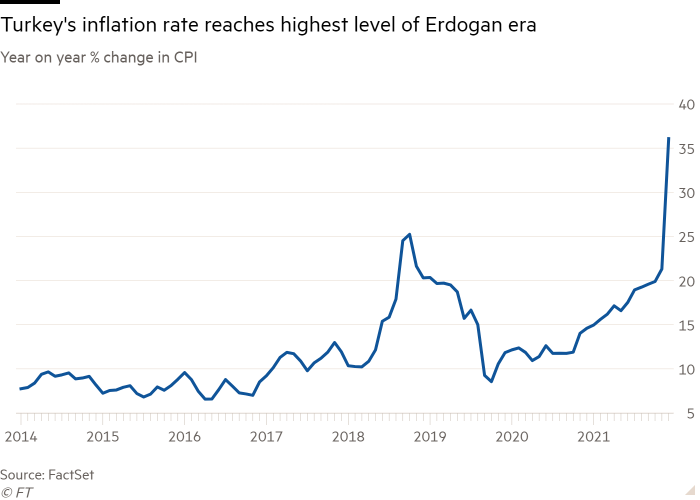[ad_1]
Turkish inflation has reached its highest level since Recep Tayyip Erdogan came to power almost two decades ago as the president’s contentious economic management sparks a surge in prices.
The country’s consumer price index rose 36 per cent year on year in December, according to data released by Turkey’s statistical agency on Monday.
It marks the highest level of consumer price rises since September 2002, when Turkey was reeling from a financial crisis that paved the way for a landslide election victory for Erdogan’s Justice and Development party (AKP) in November that same year.
The figure, a sharp increase from the previous month’s official inflation rate of 21 per cent, comes after president Erdogan ordered the central bank to repeatedly slash interest rates in recent months despite double-digit inflation.
His insistence that the bank lower its benchmark lending rate by a total of 5 percentage points since September, to 14 per cent, has led to deeply negative real interest rates, causing investors to flee from the Turkish lira and stoking inflation in a country that is highly reliant on imported energy and goods.
That in turn has prompted mounting public discontent about the soaring cost of living, and has led to an erosion of support for the AKP in opinion polls.

December’s inflation rate, which was higher than the consensus estimate among analysts of 30 per cent, was driven by hefty increases in the cost of transport, which rose almost 54 per cent year on year, and food and drink, which rose close to 44 per cent.
In a sign of the pain being inflicting on business by the plunge in the lira, which lost about 45 per cent of its value against the dollar in 2021, the producer price index rose significantly faster at a rate of 80 per cent year on year.
Ibrahim Aksoy, an analyst at HSBC in Istanbul, warned that inflation was likely to rise further in the months ahead, predicting it would reach about 42 per cent in April and May.
The figures were met with dismay from the country’s opposition parties. Durmus Yilmaz, a former central bank governor who now serves as a senior official in the IYI party, said inflation was “the root cause” of the country’s economic problems and called for “an urgent stabilisation programme”.
Ali Babacan, a former Erdogan ally who now leads the opposition Deva party, suggested the true inflation rate was even higher than the official figures, describing the country’s statistical agency as “the institute for fiddling the numbers”. He said the rate “doesn’t even come close to” the huge energy price rises announced at the start of this year, which saw electricity prices raised by as much as 125 per cent for the most intensive commercial users and by about 50 per cent for households.
Erdogan, a longstanding opponent of high interest rates, rejects the conventional economic wisdom that raising the cost of borrowing helps to curb high inflation.
The Turkish president has continued to insist, despite mounting dismay from Turkey’s business community, that lower rates will ultimately help bring price stability as part of what he says is a new economic model that aims to boost exports, investment and job creation.
Erdogan has acknowledged the pain inflicted by inflation on the public, vowing last month that his government would not allow workers to be “crushed” by price rises as he announced a 50 per cent rise in the minimum wage in lira terms.
Economists warned that, while a pay rise for the lowest paid workers was necessary to protect them from rising living costs, such a large increase would itself be inflationary and price rises risked running out of control.
[ad_2]
Source link

